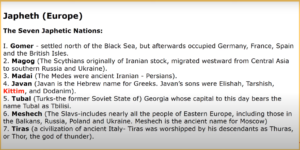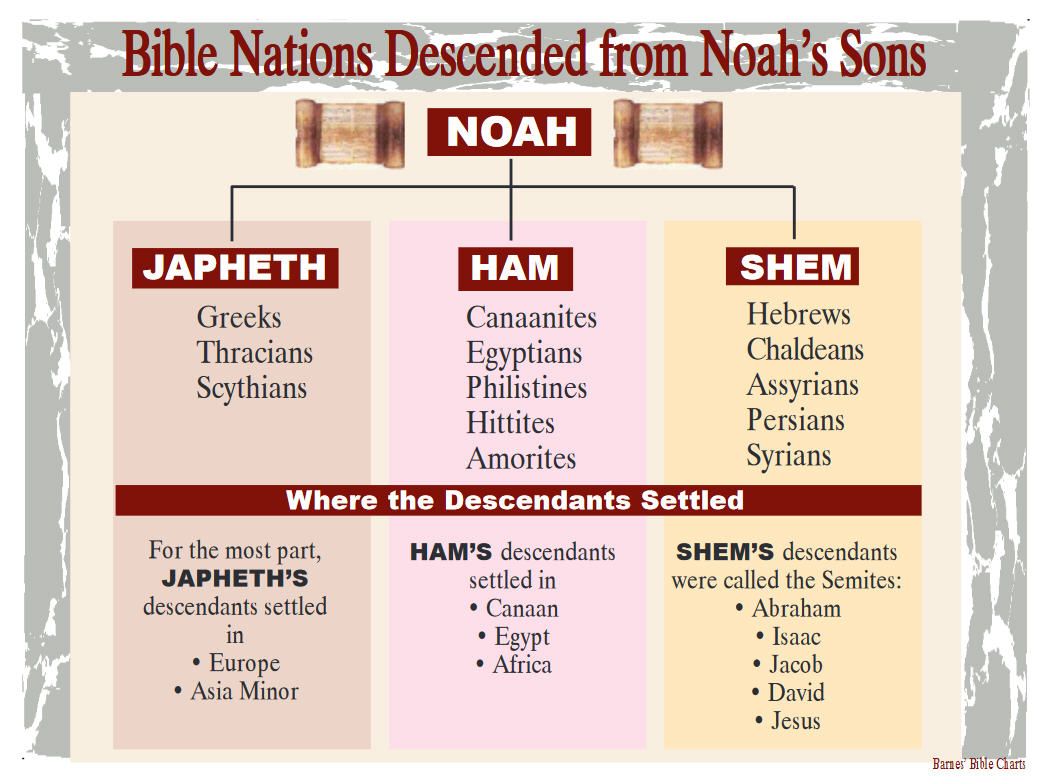I want to ask you a question. Are you a Gentile? You may be wondering why I’m even asking you that question. I’m asking because Bible scholars told us who the Gentiles were and we just accepted it as true without really searching the Scriptures to see if they were right. I’m tackling a topic that some consider controversial. In order to interpret some of the end-time prophecies, understanding who the Gentiles are is extremely important. The clues are in the Bible, we just have to search it out. For example, the Apostle Paul said that he was sent to the Gentiles. Well, where did he go? There are maps showing us this information. Paul was the apostle to the Gentiles but he only taught in a specific region. In this post, we’re going to do some digging to see if religious leaders rightly divided the scriptures concerning the identity of the Gentiles.
It would seem that there is an attempt to generalize the word, ‘Gentile’, in order to direct people away from the specific nations categorized as Gentiles, as written in the Bible. The modern translation for the word Gentile is simply “the nations”. We know that the Bible says, in Acts 17:26-27, that He created all nations from one blood. The intention, in the beginning, was for us all to be one, but something happened that caused division. It was the grand rebellion at the Tower of Babel. As a result, the nations were separated. However, the Most High separated the nation of Israel unto himself and made His covenant with them. They were entrusted with His oracles. So, even though scholars want us to believe that there is no distinction, there absolutely is. The solution came through the Messiah – we see this in Galatians 6:15-16. Keep these things in mind as we look into this because the Messiah was handed over to the Gentiles for crucifixion.
I believe there are misinterpretations about last day prophecies because Bible commentators got the players wrong. They’re looking at the wrong people and yes some of it has been intentional. Now is the time to address this and you may be surprised by what we uncover. If you go back and read Luke 21:7, you’ll see that the disciples asked the Messiah to tell them what the signs would be in the end times. You will see that He answered their question by giving them a list of things that would happen and the signs to look for. This is highlighted in Luke 21:23-28.
He said a certain group of people would fall by the sword (this happened in 70 AD – when Jerusalem was taken) but all of them didn’t die. He said some would be led captive into all nations. Folks, slavery would scatter people all over the world as captives. This was not a voluntary migration, it’s the fulfillment of this prophecy of worldwide slavery. It leads many to point out, that the transatlantic slave trade was the only worldwide slavery to occur after the time of Christ. If you know of another group of people that this happened to, please let me know. You notice He’s telling them who would be in the land when He returns. It’s not referring to “the nations”. It’s specific to a certain group of people – the Gentiles. He’s saying, these people would be ruling, and they would be in the land until the times of the Gentiles are fulfilled.
So, do we need to know who He was talking about when He was saying that Gentiles would be in the land? Absolutely! Let’s start with how the word is defined because Gentile, the word itself, it’s a Gentile word. It came into the English language by way of the fourth century Vulgate (this was the Roman Catholic Church’s authorized Latin translation of the Hebrew Bible). In the Vulgate, St. Jerome translated the word Goy or Goyim and it’s used to refer to tribes. It’s translated: 373 times as nation(s) | 142 times as heathens | 30 times as gentiles | 11 times as people(s). This is why you have to read the context and understand the history to know when you’re to use one of those definitions. You definitely have to rightly divide to understand who’s being referred to. But again, if we look at the context it helps us tremendously. Oftentimes, we’ve been given an interpretation of scripture ignoring the context and the law of first mention can help by explaining how the word was used initially. Law of first mention is a principle used by Bible scholars for exegesis or to interpret the Scripture. It simply means that the first time a word or phrase is used in Scripture, it’s going to be the most authoritative in defining that word or phrase. I’m going to show you how the word ‘Gentile’ was being defined when it was first used, then we’ll look at how the Apostle Paul used it, and then most importantly how the Messiah was using it.
So again, using the law of first mention, let’s go back and see how it was used the first time it appeared in Scripture and that comes from Genesis 10:5. We have here the nations that descended from Noah and we are looking at the genealogy of the sons of Noah: Shem, Ham, and Japheth. The earth was repopulated through these three sons, but in this post, I’m focusing primarily on Japheth. In Genesis 10:2-4, we find the descendants of Japheth. Genesis 10:5 then reads, “From these [from these names, from these sons and their sons] the coastland peoples of the Gentiles were separated into their lands, everyone according to his language, according to their families, into their nations.” I’d like for you to go back and read Genesis chapter 10 in its entirety. You will find that this word, ‘Gentiles’, is not listed when it lists the genealogy for Ham or Shem. It’s only used when referring to Japheth. With the sons of Japheth, you’re primarily talking about the European races (the Seven Japhetic Nations). After you read through Genesis 10, you will find that the word Gentile is not ascribed to the sons of Ham or Shem it was only used in association with the sons of Japheth.

Again, in this post, the focus is on Japheth and his descendants. Through Javan, we have Kittim (this is Rome). Through Gomer is where we get the line of Ashkenaz – we know them today as Ashkenazi and they live in the land of Israel today as the children of Israel. Based on the Scripture, the true children of Israel came through the line of Shem and through Abraham. They did not come through the line of Japheth, through Gomer, and Ashkenaz. With the prophecy of the Messiah in Luke 21:24, He said Jerusalem would be trampled underfoot by the Gentiles until their time was fulfilled. If you believe that we’re living in the last days (and all the signs clearly point to that) then the prophecy indicates that Gentiles would be in control of the land because the house of Israel and the house of Judah got kicked out because of their sin. Let’s see if we can find any proof of that.
The Bible identifies the locations where the tribes of Israel were scattered to. Isaiah 11:11 says, “And it shall come to pass in that day that the Most High shall set His hand again the second time to recover the remnant of His people which shall be left from Assyria, and from Egypt, and from Pathros, and from Cush, and from Elam, and from Shinar, and from Hamath, and from the islands of the sea.” Note that Pathros, Cush, Elam, Shinar, and Hamas were the ancient names of the nations now identified as Upper Egypt, Ethiopia, Iran, Iraq, and Syria. The people (the house of Israel) are scattered in that area what most call now the Middle East and then some in Africa. When Ethiopia occurs in our English translation of the scripture, it’s talking about Cush in Hebrew. Remember Cush is a son of Ham. The Cushites were a dark race and we’re so described on the monuments but were distinct from the Negros.
In Isaiah 11:12 it says, “And he shall set up an ensign for the nations and shall assemble the outcasts of Israel and gather together the dispersed of Judah from the four corners of the earth.” Judah was scattered to the four corners, but if you read the previous verse (v. 11), they – the house of Israel – are in or around the land near Israel in in the Middle East and a lot of them are in Africa. They’re still scattered; they’re not in the land. With the slave trade from Africa to the Americas between 1650 and 1860, approximately 10 to 15 million enslaved people were transported from western Africa to the Americas. Most were shipped to the West Indies, Central America, and South America. Messiah referenced one of the curses in to come on the people in the last days from Deuteronomy 28:39 saying, Israel is going to be led away captive into all nations. Now most people are saying, “well this happened when they went to Egypt.” But this was spoken by Messiah in the New Testament. They had already been in Egypt, therefore it could not be talking about when they went to Egypt. Messiah said, “you’re going to be scattered into all nations.” Egypt was just one.
I want to share these scriptures with you to show you that there is a clear distinction because now there is a theology called, ‘the replacement theology’. It basically says, there is no more Israel; we’re all Israel now, once we’ve come into the faith. I want you to read these scriptures and see that the Apostles understood that there was a clear distinction: Ephesians 2:11-12 | Romans 11:25 | 1 Peter 4:3 | Isaiah 61:9 | Revelation 11:12 (an end time prophecy)
There is still a place for the children of Israel. They were the natural branches. You can’t just say there’s no need now for Israel or that Israel has been displaced. If you’re grafted in, you’re grafted into something. You can’t replace the entire tree and then say you’re grafted in. That doesn’t make sense! We cannot just put everyone in one basket and say, “a Gentile simply means all nations.” There are clear distinctions where sometimes it is talking about heathens, pagans, those who were strangers from the covenants, and promises – they did not belong to the family of the Most High.
Some will have a hard time accepting this. There will be those who disagree particularly with me saying that the Gentiles being referenced in Genesis 10 are specific to the children of Japheth. The prevailing thought is that the translators missed it there and that it should say, ‘nations’ for all of the sons of Noah instead of just referencing it to the children of Japheth. But how do you explain that the nations Paul ministered to when he said he was sent to the Gentiles correspond with Genesis 10:5? How do you explain that when the Scriptures say the Messiah was handed over to the Gentiles, He was handed over to Roman rulers-who are descendants of Japheth? How do you explain that the Gentiles and power are the ones from the statue shown to Daniel in his vision and they are in power until the last days, which correspond with the prophecy given by the Messiah in Luke 21 that the Gentiles will be in control of Jerusalem in the last days? How do you explain that there has always been a relationship between some of the children and Ham and the children of Shem?
Of course, Yahshua came to be the Light to the Gentiles and the Gospel is for whosoever will. That’s the beauty of salvation. It shows just how just and merciful He is that He made it available to all who will accept Him. This mystery is that the Gentiles are also fellow heirs – the members of the same body and partakers of the promise in Christ through the Gospel (Ephesians 3:6). Then in Ephesians 6:9, it says, in Him there is no partiality. He wants all to be safe to come to the knowledge of the truth. In Isaiah 60:1-3, it’s talking about the Messiah that all can come through Him come to Him through faith. All can come to Him if they will receive Him and believe that He is the One sent to bring salvation.
Learn more when you view the accompanying video, Who Are The Gentiles In The Bible l Learn the Truth.



